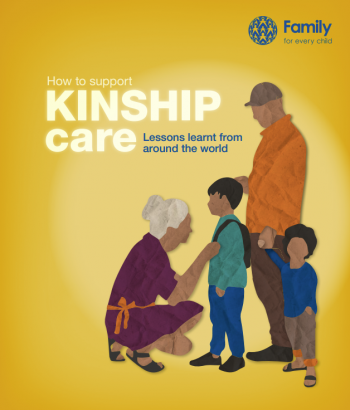
written by Family for Every Child
 Across the world, around one in ten children are growing up in the care of their extended family. Depending on where they live, this could involve their relatives - both blood and through marriage - or close family friends. Often, although not always, referred to as kinship care, (kin meaning family) this type of care is increasing in many countries. Kinship care has benefits for both children and caregivers. Through it, caregivers find companionship, practical support and the satisfaction of helping a much loved child to flourish. Children who don’t live with their biological parents prefer it over other types of care. It offers the stability, continuity, sense of belonging and links to family identity that foster care or institutional care might lack.
Across the world, around one in ten children are growing up in the care of their extended family. Depending on where they live, this could involve their relatives - both blood and through marriage - or close family friends. Often, although not always, referred to as kinship care, (kin meaning family) this type of care is increasing in many countries. Kinship care has benefits for both children and caregivers. Through it, caregivers find companionship, practical support and the satisfaction of helping a much loved child to flourish. Children who don’t live with their biological parents prefer it over other types of care. It offers the stability, continuity, sense of belonging and links to family identity that foster care or institutional care might lack.
We are all rooted in our family in one way or another and the depth of these roots plays a large part in how we find our place in the world. The Guidelines for the Alternative Care of Children recognises this when it states that kinship care should be the next choice for children outside the care of their biological parents. Surprisingly, although kinship care is widely used, recognised and valued in many countries, it is remarkably under-supported by governments. Whilst most children in kinship care are well loved and well cared for, lack of support can place them at risk.
So how can we reduce the risk?
One of the first steps is to explain why supporting kinship care is so important and why policy change is essential. Family for Every Child, a global alliance of local civil society organisations working with children, has done just that. In collaboration with other key stakeholders, Family for Every Child has facilitated the development of global guidance on kinship care. Aimed at both policymakers and practitioners, the guidance puts forward a clear and compelling argument for the support of kinship care. It also provides principles of good practice and lessons learnt from across the world.
The guidance highlights that the needs of kinship caregivers and children can be complex and responses can’t be simple. The needs of kinship caregivers differ from the needs of biological or foster and adoptive parents, and therefore support services need to tailor their services accordingly. They need to involve many different services and people, especially kinship caregivers and children. In some contexts, this might mean care systems need to become more family-focused and strengths-based. In others, the social workforce may need upskilling to better understand and respond to the needs of kinship care.
All kinship caregivers and the children in their care, no matter where they live, should have access to the support they need to keep them safe and help them flourish. The guidance is now available. Join us n spreading this message by downloading and sharing the guidance across your networks.
